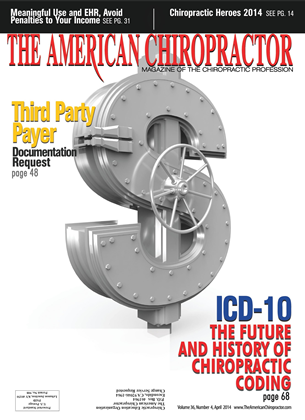There is a new paradigm of functional medicine (FM) emerging. It utilizes wellness medicine techniques and employs scientific, clinical, and laboratory diagnostic methods to help the practitioner see the underlying causes of illness and notice places for early intervention by detecting physiological imbalances long before illness manifests as symptoms (sometimes decades early). By educating patients on the importance of wellness. a greater number of individuals will become healthier and, hopefully, be able to avoid expensive, disease-based interventions. Southern California University of Health Sciences in Whitticr. California is the first to offer six separate classes on functional medicine that cover cpigcnctics. laboratory testing, functional endocrinology, and much more as part of the core curriculum. Win is this important for chiropractors? The good news for chiropractors is that main state chiropractic laws often dictate that if a technique or therapy is taught at an accredited chiropractic school, then it is allowed under their scope of practice. Depending on the state, main chiropractors can even draw blood in the office, but the point is that patients need to take charge of their health before there is a problem. They need to be proactive and be evaluated in time while values are out of an optimal range (as opposed to the lab range) and easily modifiable with diet, supplements, and lifestyle. When one is exposed to "optimal values" and not just the upper and lower limits of full-blown disease, it is possible to assess concerns that "fly under the radar." The definition and practice of functional medicine is as varied as the number of practitioners calling themselves functional medicine practitioners, which is a major hurdle to implementing a standardized curriculum to make students and doctors feel comfortable. There arc some foundational principles that all forms of functional medicine—or holistic, intcgrativc. or alternative medicine—have in common. The cause of illness is multifactorial, and it is not solved by utilizing a pharmaceuti- cal approach. Dealing with inflammation, energy metabolism, hormonal imbalances, gastrointestinal problems, and so on takes looking for the cause in nutritional deficiencies, aberrant lifestyle habits, toxic exposure, and even mental attitudes. Unless doctors are trained to discover these causes and are given effective means to educate patients using diet, nutritional supplementation, exercise, and other natural means, then the state of health in this country will continue to deteriorate. Functional medicine protocols can be tailored to best suit individual needs based on unbiased lab values. Evidence is mounting that shows that practitioners who use objective measurements and protocols rooted in sound physiological science consistently demonstrate effective long- and short-term outcomes. Extensive testing beyond the typical blood test can uncover a bigger health picture. For instance, a typical blood test will not flag glucose until it reaches 100 (some labs won't flag it until it reaches 110), whereas catching it in the 90s is proactive and can increase the potential for optimal health. In addition, simply testing glucose levels is a good example of why it is easy to miss the big picture. A glucose reading is just that—a single reading in time that neglects to give an indication of glucose levels over time. If a patient has reactive hypoglyccmia (as mam do), then a single reading could miss catching the glucose level when it bounces higher. Mean plasma glucose and HbA lc are more accurate measurements of glucose levels over time. In most states, chiropractic co-ops offer steep discounts (up to 90% off retail) that make testing feasible. Computer programs can in turn expedite the infomiation processing and facilitate analysis, but practitioner knowledge is critical. If a practitioner is to take on the responsibility of ordering even routine wellness labs, then that practitioner must be able to assess the lab findings accurately, as well as effectively correlate the lab data with clinical findings to provide a more complete, thorough, and accurate assessment of the patient's condition. Rather than "dabbling" in any area of the healing arts and sciences, including functional medicine, it is better to learn the material in a comprehensive manner. Intcgrativc training must strive to use all available resources, including laboratory and clinical evidence, to render patient education and treatment recommendations, which empower patients with knowledge and self-responsibility. In order to do this, the practitioner should be trained (and trained well) in such methods. This sometimes is referred to as "lifestyle medicine" or "wellness medicine." An excellent opportunity to learn and incorporate functional medicine into practice is offered in a scries of modules designed to increase confidence in this area. The scries is taught by Dr. Brandon Lundcll. instructor of the first university-sanctioned, core-curriculum functional medicine classes. Call 1-866-271-8888 for more information about these educational classes, which will be offered in Denver. Colorado 2014. Lynn Toohey PhD received her doctorate in nutrition from CSV Ft. Collins, CO. She lectures to and counsels chiropractors and other health professional on nutrition and complementary medicine. Brandon I.undell, DC, DABCI, DiplAc, \K,. [PC has a successful, 6 mo. wailing list practice, lectures nationally on Functional Medicine, and teaches FM classes at So. Cal. U of Health Sciences. Brandon Lundell, DC, DABCI, Dip! Ac, NE, APC has a successful, 6 mo. waiting list practice, lectures nationallv on Functional \ leilicine, leaches I'.\ I classes al So. ('al. U of Health Sciences and also teaches a series of FM modules in Denver, C O 2014.
 View Full Issue
View Full Issue












